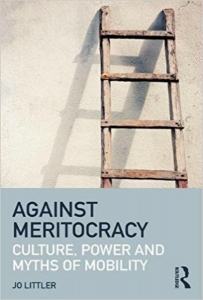In Against Meritocracy: Culture, Power and Myths of Mobility, Jo Littler offers a rich analysis that intricately teases out the grasp ‘merit’ and ‘meritocracy’ have on everyday cultural and social narratives of value and power in contemporary society. This is a rewarding contribution to the shared work of challenging hegemonic, neoliberal myths that uphold the status quo, recommends Sarah Burton, and to the building of a better and fairer world.
Against Meritocracy: Culture, Power and Myths of Mobility. Jo Littler. Routledge. 2017.
Modern life is shaped by a persistent and sinister narrative: that if you just work hard enough, you can improve yourself and so improve your situation in life. If you’re poor, miserable, unglamorous or unfulfilled, then you’ve simply not really applied yourself – you lack the grit, resilience and determination to ‘make it’, and that’s no one’s fault but your own. This is a familiar social story, and one often insidiously spun back on us in our own assessments of our individual selves and worth. Whilst a large body of scholarship exists challenging the idea(l)s of social mobility as possibility, what has not – until now – been successfully achieved is an intricate teasing out of the grasp ‘merit’ and ‘meritocracy’ have on the creation of everyday cultural and social narratives of value and power.
Jo Littler’s book, Against Meritocracy, is a richly analytical contribution to scholarship on power, neoliberalism and questions of value that responds to significant gaps in the scholarship. Its combination of social theoretical historicising and contextualising of the term ‘meritocracy’, combined with a cultural studies approach to locating the action of meritocracy in everyday life, provides a substantial and fine-grained examination of the subtleties of power and agency in social life. Littler’s work shows in great detail how the narrative of ‘hard work’ and ‘making it’ I note above has become so present and alive in Global North societies (2) – and it’s by drawing this kind of sharp attention to the way such destructive narratives are mobilised, and who they work for, that we position ourselves to challenge and reject them.
The book is divided into two parts: ‘Genealogies’ and ‘Popular Parables’. The latter is where Littler’s cultural studies (in the vein of Stuart Hall and CCCS, 10) approach shows its strength. As she notes, meritocracy ‘needs to be unpacked as an ideologically charged discourse’ (8), rather than in the ‘uni-disciplinary fashion’ (8) that most of the (scarce) analyses of the term follows. The second half of the book looks in detail at three empirical examples of meritocracy in action in the cultural, political and economic spheres – plutocrats and elitism; the film industry; and the notion of the ‘mumpreneur’. This is set up by a first part which traces the genealogies of meritocracy through social theory, political rhetoric and the welfare state, including ideas of social mobility. Here, Littler demonstrates the very complexity of the term – the ways in which it is slippery, malleable and tricksy, and how this facet has made it so perfect as rhetoric which ‘promises opportunity whilst producing social division’ (3). Putting this to use in the latter section results in a particularly coherent study, and whilst each chapter can be read in isolation, it is worth noting that Against Meritocracy is one of those unusual academic books which is actually pleasurable to read from cover to cover.
 Image Credit: (pru_mitchell CC BY 2.0)
Image Credit: (pru_mitchell CC BY 2.0)
The genealogical beginning of the book – which takes in social theory, literature, history and meritocratic metaphors – allows Littler to foreground a number of important components of meritocracy, and to disimbricate the various ways the concept is employed. She disaggregates two key forms of meritocracy: firstly, as a ‘social system which is based around the idea that individuals are responsible for working hard to activate their talent’ (8); and secondly, as ‘an ideological discourse, as a system of beliefs which constitute a general worldview and uphold particular power dynamics’ (9). Importantly, Littler emphasises that i) there is significant ‘slippage’ (25) between these two systems of meritocracy; and ii) the more left-wing and social justice-oriented ‘equality of outcome’ is often now framed instead as simply ‘equality’, thus further blurring the terms of the debate (27). This segues nicely into Littler’s drawing of our attention to the precedence of the individual in formulations of meritocracy (24), which she twins with a recognition that a Western narrative of social mobility, allowing a few who work hard to rise to the top, ‘is extremely compatible with capitalism’ (27).
This conceptual vagueness and focus on the individual is central in the sleight of hand outlined in Chapter Four, ‘Just Like Us?: Normcore Plutocrats and the Popularisation of Elites’. Here, Littler successfully hones in on the ways epithets of ‘elite’ have shapeshifted to obscure the structural inequalities brought about by and engendered through global capitalism. The chapter opens with the simple but perceptive statement that:
Whilst the existence of elites is hardly new, what is to some degree more historically novel is the extent to which large sections of today’s plutocracy feel the need to pretend they are not an elite at all (115).
This guising – a performance of ordinariness – is a cultural and social trick which conceals the machinations of capitalism that creates a strata of the ‘super wealthy’ who live off ‘unearned income’ – i.e. assets that yield rent, interest or capital gains (117). The assertion ‘just like us’ enables structural privilege to be passed off as talent or merit – which in turn, as Littler states, allows plutocrats to ‘maintain and increase their power and wealth’ (120). This ‘keeps the idea of social mobility churning’ (129), thus legitimating the super-rich and the processes of global capitalism and inequality from which they draw their wealth. Littler pulls out the real danger of this pretence at the end of the chapter, noting that:
the flourishing of the ultra-wealthy has been continually enabled whilst socialised provision continues to come under repeated attack. It is an attack which happens by stealth, and the super-rich continue to promote an idea that we can all get to the top; that society is still equal (139).
However, this narrative is complicated, with Littler pointing out that widely circulated images of ‘fat cats’ (139) ‘have had an important role in popularising the conception that the super-rich can be a negative social force’ (139). Crucially, though, she notes that these critiques are still largely individualised, rather than engaging with the institutions and social practices that enable and legitimate elitism and elites (139).
The book also directly confronts the very notion of ‘merit’ in Chapter Five, ‘#Damonsplaining and the Unbearable Whiteness of Merit’, which deserves extensive kudos for the punning alone. Through analysis which focuses on merit as racialised, Littler pulls out a broader issue of the way ‘meritocratic discourse can mobilise a very essentialised conception of ability which ignores or downplays social context and the role social context has in deciding what merit might be’ (155). This context is – as is shown by the #Damonsplaining incident itself – racialised. Whilst the work in this chapter is oriented around the film industry and wider cultural products, such as literature (157), it also presents helpful theoretical insights for those of us engaged in work on questions of value, authority and legitimacy in epistemology and ontology. As Littler points out, ‘“merit” is mobilised as a term which is ostensibly colour-blind and neutral’ (156), thus not only fitting with ‘the post-racial neoliberal dream which simultaneously uses criteria that privilege white men’ (156), but is also marshalled as a defence against calls for ‘diversity’. Thus what ‘merits’ is continually framed through and by whiteness, but also passed off as ‘naturally’ so (157; see also Burton, 2015). The key achievement of this chapter is in its precise and careful outlining of the continued presence of the universalised white male body which shapes the putatively value-free notion of ‘merit’.
To be briefly critical, I did at times want more of a close textual analysis of the cultural matter that underpins the latter chapters. The work tends to return to the theoretical in a swift enough manner that can lend the feeling that the cultural examples used are rather glossed over – presented as a jumping-off point for analysis, rather than things we’re meant to find interesting in and of themselves. Given, though, that this isn’t a book about meritocracy in The Apprentice/Mumsnet/Hollywood or whatever else, it’s entirely forgivable. Littler’s work is best read alongside that of Nirmal Puwar (2004), Bev Skeggs (1997), Steph Lawler (2014), Sara Ahmed (2017) and Imogen Tyler (2013), in that it extends the work of these scholars whilst contributing a fine-grained analysis of meritocracy that enables a fruitful re-reading of what’s come before. This chimes with the sensitivity of Littler’s dedication in her ‘Acknowledgements’ – that the book is ‘a way to help the arguments, movements, strategic discussions, and conversations about how we can share’ (xiv). This is certainly a contribution that shares in the work of debunking capitalist, neoliberal and hegemonic myths that uphold the status of those already in power and, as such, it will be a rewarding site for collective thinking and action vis-à-vis building a better – fairer – social world.
_________
Note: the above was originally published on LSE Review of Books.
About the Reviewer
Sarah Burton is Teaching Fellow in Sociology at Durham University. Prior to joining Durham, she completed her PhD, ‘Crafting the Academy: Writing Sociology and Disciplinary Legitimacy’, at Goldsmiths, and has studied English Literature, Education and Sociology at the universities of Newcastle, Cambridge and Glasgow. Sarah’s research focuses on practices and processes of knowledge production, social inequalities and literary sociology. Her publications include ‘The Monstrous ‘‘White Theory Boy’’: Symbolic Capital, Pedagogy and the Politics of Knowledge’ and a contribution to the 50th anniversary special issue of Sociology, ‘Becoming Sociological: Disciplinarity and a Sense of Home’. In addition to her work at Durham, Sarah sits on the Executive Committee of the Feminist and Women’s Studies Association, and is a member of Glasgow Refugee, Asylum and Migration Network. Read more by Sarah Burton.


 Find this book:
Find this book: 




